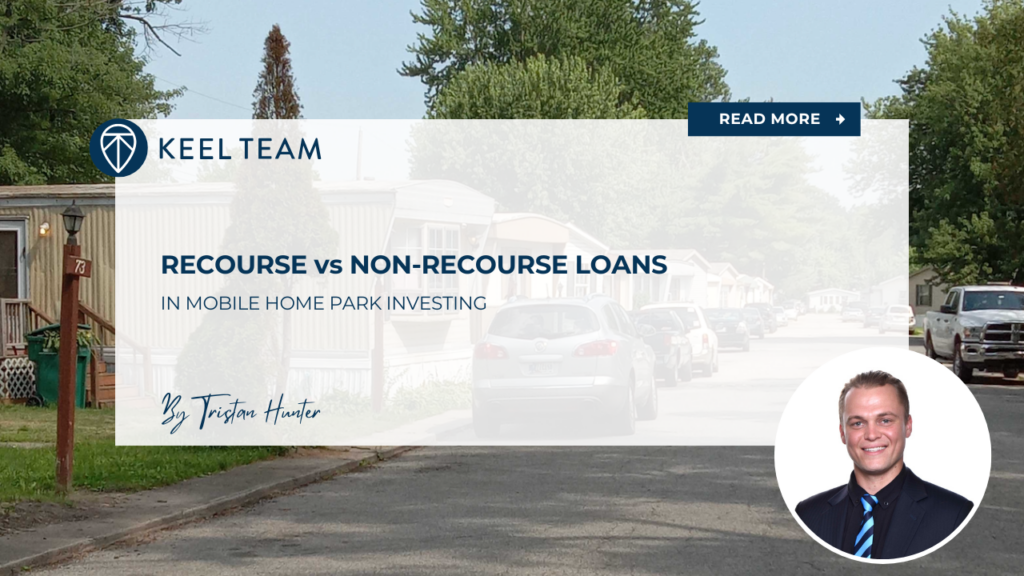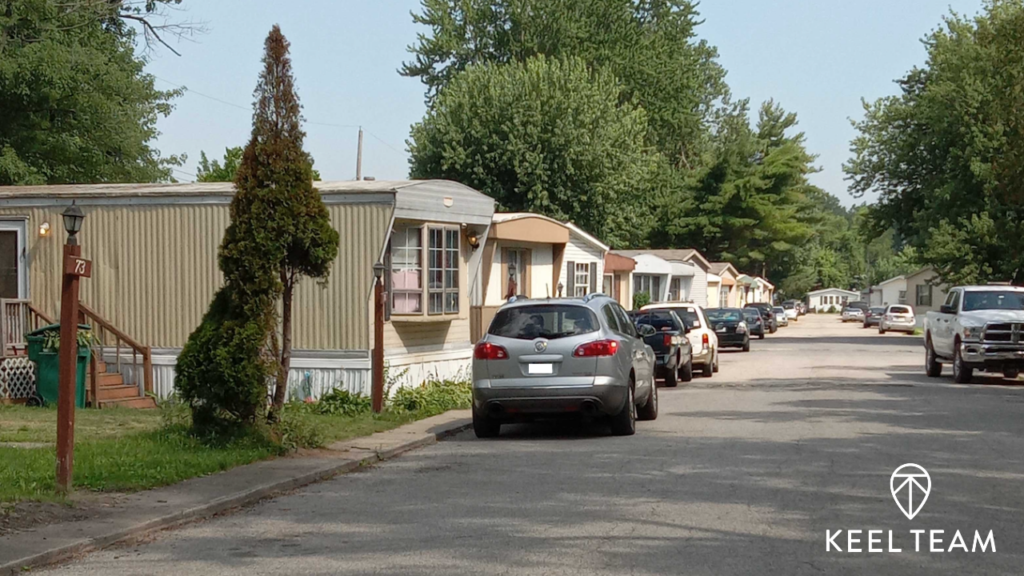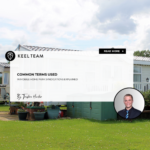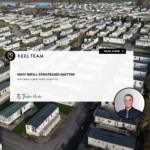Recourse vs Non-Recourse Loans in Mobile Home Park Investing
-
 Tristan Hunter - Investor Relations
Tristan Hunter - Investor Relations

Financing is a critical aspect of mobile home park investing, and understanding the differences between recourse and non-recourse loans can help you along the way. Each loan type has unique features that can impact your risk, liability, and investment strategy. This guide will help you explore these two loan types and their role in mobile home park investments.
What Are Recourse Loans?
A recourse loan allows the lender to pursue the borrower’s personal assets if the loan defaults and the property sale doesn’t cover the debt. In other words, the borrower has full responsibility for the loan balance.
For example, if you invest in a mobile home park and default on a recourse loan, the lender could seize other assets, such as savings or property, to recover the remaining amount.
Key Features of Recourse Loans
- Full Borrower Responsibility: The borrower is fully liable for repaying the loan, even beyond the property value.
- Lower Interest Rates: Recourse loans often come with slightly lower interest rates, as lenders face less risk.
- Easier Qualification: Lenders may approve recourse loans more easily because they typically have more security.
Download our FREE eBook on the Top 20 things to know BEFORE investing in mobile home parks!
What Are Non-Recourse Loans?
A non-recourse loan limits the lender’s ability to pursue the borrower’s personal assets. If the borrower defaults, the lender can only claim the collateral property—typically the mobile home park—and cannot seize additional assets.
Non-recourse loans reduce the borrower’s financial exposure, which makes them appealing in riskier investments. However, they often come with stricter qualification requirements.
Key Features of Non-Recourse Loans
- Limited Liability: The borrower’s liability is restricted to the collateral property.
- Higher Interest Rates: Non-recourse loans usually carry higher rates to compensate for the lender’s increased risk.
- Stricter Qualification Criteria: Lenders require stronger financials or more substantial down payments to approve non-recourse loans.
Differences Between Recourse and Non-Recourse Loans
| Aspect | Recourse Loan | Non-Recourse Loan |
|---|---|---|
| Borrower Liability | Full personal liability | Limited to collateral property |
| Interest Rates | Lower | Higher |
| Risk to Borrower | Higher | Lower |
| Qualification Ease | Easier | Stricter |
Understanding these differences is crucial when deciding which loan type aligns with your mobile home park investment strategy.
Benefits of Recourse Loans in Mobile Home Park Investing
- Lower Borrowing Costs: Recourse loans often offer better interest rates, reducing monthly payments.
- Easier Access to Financing: Lenders are more willing to approve these loans, which could accelerate the acquisition process.
- Potential for Higher Leverage: You may qualify for higher loan amounts, allowing you to invest in larger mobile home parks.
Risks of Recourse Loans
- Exposure to Personal Assets: In the event of default, your personal assets could be at risk.
- Increased Financial Pressure: Full liability can add stress to your investment, especially during market downturns.
Benefits of Non-Recourse Loans in Mobile Home Park Investing
- Limited Financial Risk: Non-recourse loans can protect your personal assets, likely reducing overall liability.
- Peace of Mind: Knowing your exposure is limited can make the investment process less stressful.
- Attractive for Syndications: Non-recourse loans can be more appealing for passive investors in mobile home park syndications.
Risks of Non-Recourse Loans
- Higher Costs: The increased interest rates and stricter terms can make non-recourse loans more expensive.
- Foreclosure Risk: If the property doesn’t perform well, the lender could seize it without further recourse.
When to Consider Recourse Loans
Recourse loans might be a good option if:
- You have strong confidence in the mobile home park’s potential.
- You are comfortable taking on personal liability.
- You want to benefit from typically lower interest rates and easier qualification terms.
For smaller or less risky investments, recourse loans could provide the financing flexibility you need.
When to Consider Non-Recourse Loans
Non-recourse loans could be a better fit if:
- You want to limit your personal financial exposure.
- You are investing in a larger or riskier mobile home park.
- You are working with multiple investors in a syndication.
Non-recourse loans might provide peace of mind for investors who prioritize asset protection.

How Lenders Evaluate Mobile Home Parks for Loans
Lenders assess several factors when offering either recourse or non-recourse loans:
- Occupancy Rates: Higher occupancy indicates stable income, which appeals to lenders.
- Income Potential: Lenders analyze the property’s NOI and cash flow to ensure loan affordability.
- Borrower Financials: Strong financial health improves approval chances, especially for non-recourse loans.
- Market Trends: Mobile home parks in high-demand areas often qualify for better loan terms.
How to Choose the Right Loan Type
Selecting between recourse and non-recourse loans depends on your goals and risk tolerance. Consider:
- Your Financial Position: Can you comfortably handle personal liability, or do you need limited exposure?
- Investment Goals: Are you seeking short-term gains, long-term income, or asset protection?
- Risk Tolerance: How much risk are you willing to take on for this investment?
Evaluate these factors carefully to make a decision that aligns with your mobile home park investment strategy.
Final Thoughts
Recourse and non-recourse loans offer distinct advantages and challenges for mobile home park investors. Understanding their differences, benefits, and risks can help you make an informed choice that aligns with your financial goals and risk tolerance.
While recourse loans may offer lower costs and easier qualification, non-recourse loans provide limited liability, making them appealing for larger or riskier investments. Carefully evaluate your options and consult with financial professionals to determine the best loan type for your mobile home park investment strategy.
Are you looking for MORE information? Book a 1-on-1 consultation with Andrew Keel to discuss:
- A mobile home park deal review
- Due diligence questions
- How to raise capital from investors
- Mistakes to avoid, and more!
Disclaimer:
The information provided is for informational purposes only and is not investment advice or a guarantee of any kind. We do not guarantee profitability. Make investment decisions based on your own research and consult registered financial and legal professionals. We are not registered financial or legal professionals and do not provide personalized investment recommendations.

Tristan Hunter - Investor Relations
View The Previous or Next Post
Subscribe Below 👇





